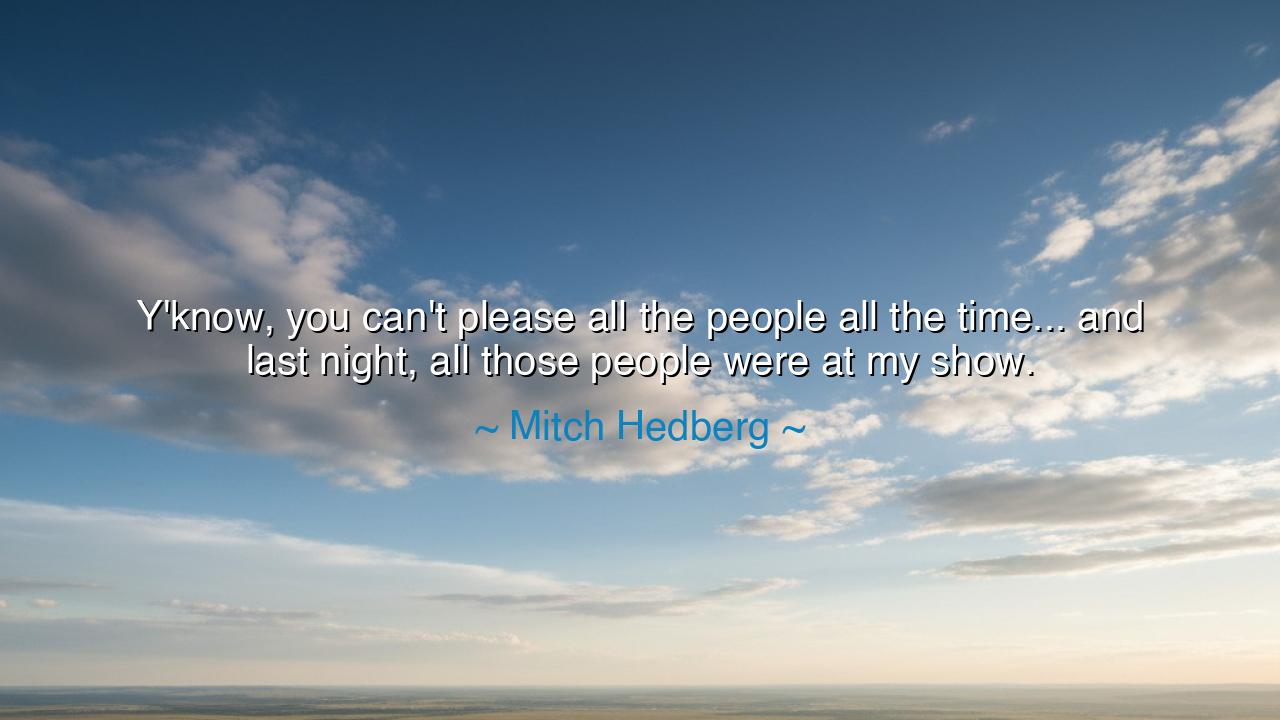
Y'know, you can't please all the people all the time... and last
Y'know, you can't please all the people all the time... and last night, all those people were at my show.






The words of Mitch Hedberg, “Y’know, you can’t please all the people all the time... and last night, all those people were at my show,” flow with humor, yet beneath their playful rhythm lies the pulse of wisdom. Spoken by a master of comedy, they carry the sting of truth wrapped in laughter. This quote reveals the eternal paradox of human striving: that no matter how great the effort, no matter how clever the craft, there will always be those unmoved, unamused, or unpleased. It is the gentle sword of irony that Hedberg wields—cutting away the illusion that universal approval is possible, and freeing us to laugh at the futility of chasing it.
The origin of these words comes from Hedberg’s own experience as a stand-up comedian, a craft that lives and dies in the reaction of the crowd. A single night can swing between triumph and silence. In comedy, more than in many arts, one learns quickly that the approval of all is impossible. Hedberg’s line is both a confession and a joke: a way of transforming failure into laughter, of showing that even rejection can become part of the performance. Thus his wisdom is born not from theory, but from the stage, where the truth of human unpredictability reveals itself night after night.
The ancients too knew this lesson. The Roman statesman Cato once said, “I had rather people ask why I have no statue, than why I have one.” He understood that seeking universal praise is a trap, for the multitude is fickle. Even Socrates, the great philosopher, was condemned by the very city that once honored him. To live or create for the pleasure of all is to court ruin, for the crowd is vast and divided, and no song, no speech, no joke can capture every heart. Hedberg, with humor, reminds us of the same: the pursuit of pleasing all leads not to joy, but to exhaustion.
History bears witness to this truth. Consider the life of Abraham Lincoln. Throughout his presidency, he was scorned by many—called a tyrant by some, too cautious by others. Yet he held firm to his vision, knowing that universal approval was impossible. He once said, “If I were to try to read, much less answer, all the attacks made on me, this shop might as well be closed.” Like Hedberg, Lincoln understood that the weight of pleasing all is too great for any man, and that true strength lies in holding to one’s purpose despite the noise of discontent.
The meaning of Hedberg’s jest is not despair, but liberation. If one cannot please all, then one is freed to create honestly, to speak authentically, to live without the crushing burden of universal applause. The laughter in his line comes from the recognition that failure, too, can be embraced, even turned into joy. By joking about the unpleased crowd, Hedberg transforms defeat into triumph, showing that the power of perspective is greater than the weight of criticism.
The lesson is thus: seek not to please everyone, but to remain true to yourself. In art, in work, in life, there will always be voices of disapproval. To build your choices upon their fleeting judgments is to live as a reed blown by every wind. Instead, stand firm in your craft, your vision, your truth. If laughter comes, embrace it. If silence comes, embrace that too, for both are part of the journey.
Practical action lies close at hand. When you face criticism, do not rush to change yourself to appease it. Listen, discern, but do not be ruled. Accept that some nights will be full of applause and others of silence. Carry both with humility, for both are teachers. And when failure comes, learn to laugh, as Hedberg did—for laughter disarms disappointment and turns even defeat into light.
Thus, in the voice of the ancients, we proclaim: Blessed are those who no longer seek to please all, for they walk freely in their truth. Blessed are those who can laugh at rejection, for they are never defeated by it. And let us remember the wisdom of Mitch Hedberg: that the unpleased will always be present, sometimes all in one room—but even then, joy is found not in pleasing them, but in embracing the humor of life itself.






AAdministratorAdministrator
Welcome, honored guests. Please leave a comment, we will respond soon